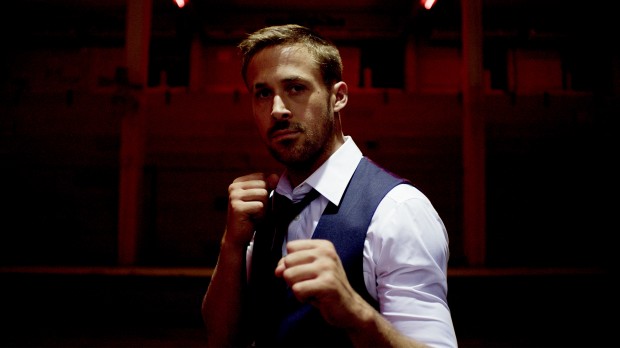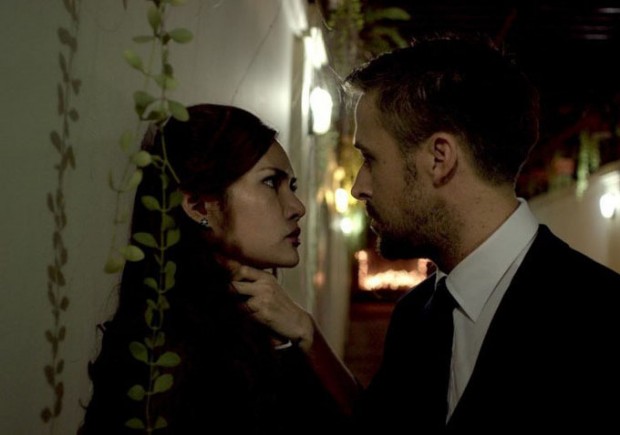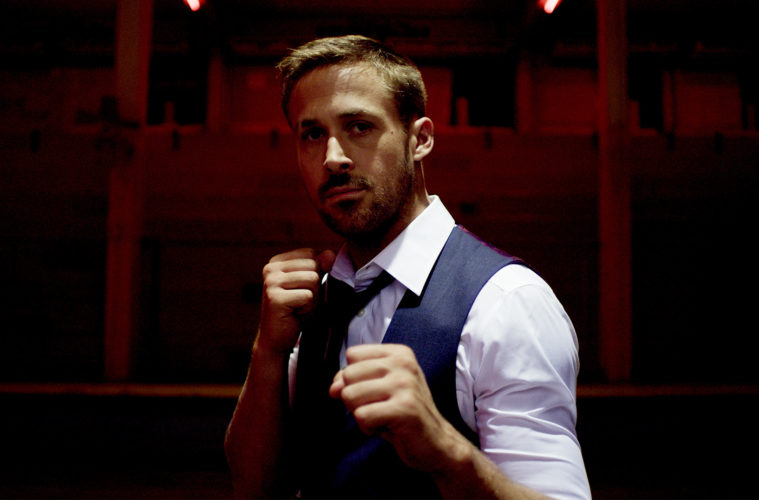
Less than a week after its dual theatrical/VOD release kicked off, Nicolas Winding Refn‘s Only God Forgives has been inspiring some of the more divergent reactions of any film released this year. While some love it — and, it seems, even more will loudly express their hatred — what about those who fall somewhere in-between, more likely to disagree on a number of finer points than the bigger picture?
Below, two of our writers debate potential merits of the Thai-set thriller, all the while struggling to determine how much of this perceived effect is intentional, what percentage is a mistake, and why it may have even been present in the first place. No matter your thoughts on it all, you’re likely to find some new perspectives.
Nick Newman: Emerging from his minor commercial breakthrough, it was expected that Nicolas Winding Refn would use Only God Forgives as the platform for yet another thriller in the vein of Drive — a mix of his “European patience” and personal love of “American thrills.” Not so: his second team-up with Ryan Gosling jettisons most of the “Nightcall”-accompanied sleekness, veering instead toward the crawling, dialogue-bereft manor of Valhalla Rising, the dire commercial prospects of which are only further exacerbated by the gory violence that comes hand-in-hand. (The instigating murder, complete with lurid red lighting and a bashed-in skull, will bring to mind the New French Extremity vibe of Gaspar Noé, who is himself said to have assisted the production in some capacity. This scene should make for a decent guess as to his influence.)
But for all its evident self-presumptions, Only God Forgives still rings as a strangely indecisive piece of work. There’s enough oblique imagery and flights of fancy to match the Jodorowsky end credits tag, what is it really “saying”? (I’m inclined to think little, past certain [albeit minor] significances resting on the surface.) To that end, no matter how polished some of it will feel — tightly locked shots! long takes! sharp angles! oh my! — other sequences are nearly incomprehensible in the intent of their shooting and editing strategies; after the technically proficient Drive, such issues are a genuine head-scratcher. Yet, all that being said, the thing moves along at a lethargic pace that’s almost hypnotic in its confidence (inflated or not), giving Winding Refn’s so very violent violence a position as more of an exclamation point than finely established characteristic. Both in spite and because of its absurdity — I really do think this is a dark, potentially wrong-headed comedy — the experience yielded a unique sense of entertainment. A slight work, a slight mess, and — for this much — a slightly good time.
Danny King: While I think it’s important not to fall into the trap of critiquing a new film merely by comparing it to the director’s previous one, I do think that the Drive comparison yields a number of insights here. There is, for starters, the fundamental difference in how the films were written: Refn is the only credited screenwriter on Only God Forgives (and, though I haven’t read it, it’s the kind of screenplay one imagines being no longer than forty-or-so pages), while Drive was adapted from a short James Sallis novel by Hossein Amini.
Interestingly, Refn’s direction is so controlling in both movies it almost feels as if the two were written by the same, sparse-minded person, but the difference can be found in the details: whereas Drive fetishized things that I found thrilling and even addicting (the Driver’s scorpion jacket and leather gloves, the grease of Bryan Cranston’s mechanic shop, the winding L.A. roads that seem to breed violence as the night goes on), Only God Forgives lends its austere, slow-motion gaze to such ugly and sadistic activities as the senseless, grisly murder of a young prostitute, the annihilation of another man at knifepoint, and the sight of a kid watching his father being executed. There’s no real pleasure to be had here.
At the same time, what’s strange and disturbing and even sort of interesting about Only God Forgives is that one can’t help but think that Refn himself would enjoy watching a movie like this. Left to his own devices after the smash critical-commercial success of Drive, this is the thing he wanted to do more than anything else. This comes through in scenes like the knifepoint massacre, which has a man being stabbed again and again for minutes on end: it would be an excruciatingly funny sequence (and is clearly intended as such) if it weren’t simply art-house torture-porn. Again, the Drive comparison is tempting: I don’t like this scene nearly as much as I like the Drive ones in which Albert Brooks thrusts his knife into people’s necks and wrists. Those scenes were quick and brutal, and they were presented judiciously; the violence in the new film is both more excruciating and less pleasurable.

Nick Newman: The divide reveals itself! Whereas you can agree that comedic intent is clear — but, nevertheless, ineffective by fault of being too extreme for any personal enjoyment — I, the weak-willed, was nearly pummeled into taking acts so obscene and grotesque to be relatively laugh-worthy. Much of it’s “art-house torture-porn,” yes, but that’s what makes this nonsense so funny: thrown to an absolute extreme, there’s the question of why it should be taken seriously in the first place. This all boils down to a simple difference in personal reaction, though I’d have to contend your assertion that Only God Forgives is communicating its images through some “austere” gaze that derives viewers of any pleasure.
Watching the film, it had occurred to me that a narrative was cleanly (or as close as this movie has to “cleanly”) split between categories of action and reaction — the former a barrage of (purposefully) upsetting images and incidents; the latter its exaggerated, uncontrollable, questionably gratifying corollary. There’s no intention for the instigating murder to be a pleasurable sight, nor is he who will punish the wicked some kind of “moral” character — so what Winding Refn does, instead, is follow through with killings and maimings that are all the more discomforting because they’re the sort of thing we’d normally want to see. Violence begets violence and the horror of said violence vaults all parties into a land of sadistic absurdity. I wouldn’t blame anyone for finding it repellent — especially when the question of tone and intent do, in fairness, feel to be so up in the air — but the process by which this plays out has its gripping qualities, at least.
Danny King: To back up the conversation a little bit, it might be useful for me to briefly sketch what some of my expectations were for Only God Forgives. While I certainly registered the negative Cannes reception, I didn’t bother reading any of the reviews at the time, and, in the weeks and months prior to that, I hadn’t much bothered to read up on the film’s production, either. All I had to go on, really, was the arresting 90-second trailer (which I was greeted with on multiple occasions in theaters) and that original logline of a story about some police guy and some gangster partaking in a “Thai boxing match.”
Admittedly, critiquing a film according to its one-sentence, IMDb-friendly synopsis is even more problematic than what I did in my previous response, but I’m going to do it anyway, since it helps illuminate some of the narrative issues I had with the film. Because that nominal Thai boxing-match sequence is, in fact, the most riveting and visceral thing in the entire movie — and, regrettably, it takes up all of two or three minutes of the runtime. And it’s not just a notable sequence for the fact that Gosling gets pummeled into bruised oblivion: it’s also formally dynamic, with Refn interweaving a variety of vantage points (overhead shots, long shots, reaction shots) in a manner that engages both physically (the punches Gosling takes are crisp and blunt) and emotionally (we sense the character’s aversion to this kind of activity).
Throughout the rest of the film, however, Refn seems almost perversely intent on dodging opportunities to give us what we want to see. Even the film’s most pronounced characterization — that of Kristin Scott Thomas’s Crystal — goes beyond camp and into a realm in which it’s not even fun to observe as a spectacle. Her opening scene, which has her chewing out a hotel clerk upon arriving in Bangkok to collect her son’s dead body, is promising enough, as it at least has some basis in reality. But every subsequent line Refn gives the actress is upsettingly extreme: by the time she’s speaking aloud about her sons’ manhood, all the possible wit in Thomas’s over-the-top portrayal gets trumped by an overwhelming viciousness and depravity.

Nick Newman: This fight scene is the highlight, yes, and it’s all the more damning that it would stand with relative tonal / formal distance from almost all else. (It’s among the only times a violent act registers as more than some sort of gesture, for one thing.) Your observation about the shot patterns is very on-point — variety-wise, it has (by far) the largest expanse of any sequence — though let’s not forget Cliff Martinez’s score, either; while I found the accompaniment he had assembled for Drive to be a repetitive, ethereal bore, his Only God Forgives score broods with the clangs of a torture dungeon before exploding into a neon nightlife-meets-Grand Guignol nightmare. This is more skillfully composed, edited, and scored than anything else in the film, and by a not-insignificant margin. I was happy to luxuriate in Winding Refn’s crawling pace — even if, admittedly, it’s sometimes due to the whole thing feeling akin to how a meatheaded type would interpret “somber” moods; this is funny to me — but I get the sense that, had it all been more in the spirit of these three-to-four minutes, we’d both be more enthusiastic.
And although I couldn’t really muster enthusiasm to outright defend the work of Kristin Scott Thomas, some credit is deserved for getting this attention-grabbing performance — or, at least, pulse-accompanied — out of an actress yours truly has never especially cared for. Again, I found this “viciousness and depravity” you cite not to be overwhelming so much as it was entertaining, mostly by virtue of being prominent enough to ensconce (again, not overwhelm) nearly all else; the Lady Macbeth-without-a-husband caricature remained engaging because she was so unrelentingly vile. Does that mean it’s a skillful piece of screenwriting or acting? Well… the debate on something seemingly so small would continue for some time.
Danny King: One thing that stuck out for me from our podcast discussion (aside from Brian’s very enjoyable jump from mild ambivalence to passionate enthusiasm), was this piece of information that Refn was originally going to make Only God Forgives before Drive. Though I don’t recall all the specifics of that revelation, the concept of a pre-Drive Only God Forgives is a fascinating one: would it have starred Ryan Gosling? Would it have consciously emasculated its hero as aggressively and crudely? We can even postulate about how different a film Drive might have been had Refn realized Only God Forgives first.
The point is, Only God Forgives plays very much like a self-aware response to the 2011 film, both in its subversion of Gosling’s penchant for violence and in the extremities of its stylization. Since you are much more familiar with Refn’s earlier work than I am, I wonder if you had any final thoughts on this matter. Does Only God Forgives strike you as being of a piece with Refn’s early-career products? Is there any light to be shed in comparing, say, the way Refn relates to an actor like Mads Mikkelsen, versus the way he manipulates the image of a Gosling?
Nick Newman: Although I’m never content to dispense presumptions about unstated artistic intent, it’s hard not to compare (even tangentially) stark behavioral differences between The Driver and Julian, all of which are only more pronounced when grouped with the “star presence” of Gosling — who’s largely responsible for either film having been made in the first place. So is it, as you would say, “a self-aware response”? I can’t really say, and none of Winding Refn’s interviews (at least the number I’ve read) would explicitly point toward this being the case — mostly because people haven’t outright asked him. The question is certainly worth pondering, though perhaps not something we should dive into too heavily.
As for the auteurist connections: I would stick by my at-the-start citation of Valhalla Rising, which also concerns itself with visions of violence and the hypnotic effect it can instill. (From Pusher II to Valhalla, his “image” of Mads Mikkelsen has been relatively consistent; possibly more emotionally open than what Gosling is given, too.) Movies like Pusher and Bronson are more clearly designed to offer the immediate gratification that so many have wanted out of his other, more methodical films; needless to say, the difference in tone and execution is markedly different. If anything, the three most recent movies (don’t call it an informal trilogy!) could mark the next path for a director who’s been working in stages almost his entire career — in their wake, it’ll be curious to see what the next results are. Will we see branching out, or keeping things “of a piece”? In spite (or, maybe, because) of Only God Forgives landing a little soft, I can’t wait to find out.
Only God Forgives is now in theaters and available to stream.
What are your thought on the film? Do you fall on either side?

